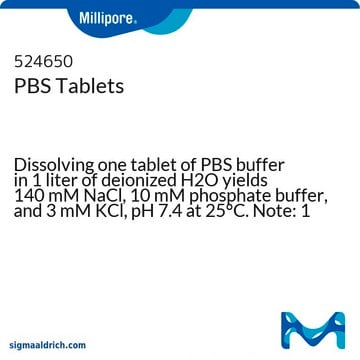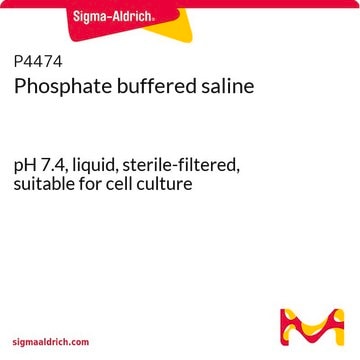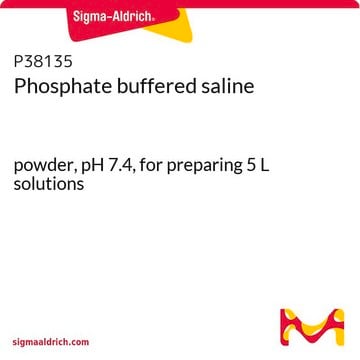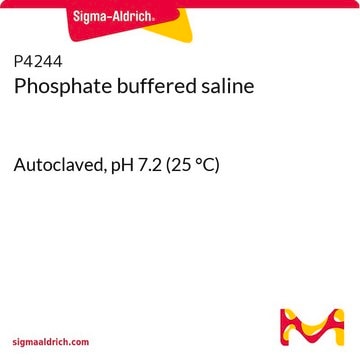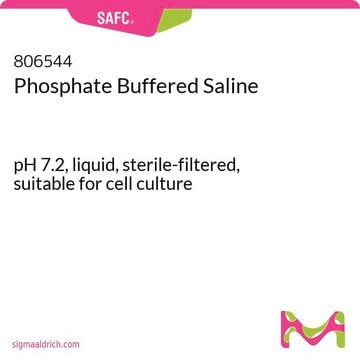P3813
Phosphate buffered saline
powder, pH 7.4, for preparing 1 L solutions
Synonym(s):
PBS
About This Item
Recommended Products
product name
Phosphate buffered saline, powder, pH 7.4, for preparing 1 L solutions
form
powder
storage condition
dry at room temperature
color
white
pH
7.4
solubility
water: soluble
density
1.19 g/cm3 at 20—25 °C
1.22 g/cm3 at 20—25 °C
application(s)
diagnostic assay manufacturing
life science and biopharma
sample preparation
Looking for similar products? Visit Product Comparison Guide
General description
The buffering capacity of PBS, maintained through a phosphate-phosphoric acid equilibrium, provides a stable pH environment crucial for optimal enzyme activity and various biological processes. This makes PBS ideal for preparing reagents, protein dialysis, and immunohistochemistry, ensuring consistent and reliable results in experiments. Beyond cell biology, PBS may also find applications in diverse areas, including the creation of custom ELISA buffers to ensure optimal antibody-antigen interactions. Additionally, PBS can serve as a running buffer for Protein A/G chromatography, facilitating antibody purification based on specific antigen binding. In hematological and biochemical procedures, PBS is widely used for washing cells and tissues.
In summary, PBS emerges as an indispensable tool in both biological and biochemical research, offering isotonicity, buffering capacity, simplicity, and stability. Its diverse applications in cell biology, reagent preparation, protein purification, and various biological assays underscore its significance in advancing scientific knowledge and understanding.
Application
- in the washing solutions during immunofluorescence procedure.
- for the suspension of bacterial cells.
- during the fixation and immunostaining procedures.
- for rinsing fixed tissues and creating a suitable buffer environment in the immunolocalization process
- as a diluent to assess the performance of an ELISA test kit
- as a buffer in an immunohistochemistry procedure
Features and Benefits
- High-quality product suitable for multiple research applications
- Can be used as a buffer component in biological and biochemical applications
- Highly soluble in water
Packaging
Reconstitution
Other Notes
Storage Class Code
13 - Non Combustible Solids
WGK
WGK 3
Flash Point(F)
Not applicable
Flash Point(C)
Not applicable
Certificates of Analysis (COA)
Search for Certificates of Analysis (COA) by entering the products Lot/Batch Number. Lot and Batch Numbers can be found on a product’s label following the words ‘Lot’ or ‘Batch’.
Already Own This Product?
Find documentation for the products that you have recently purchased in the Document Library.
Customers Also Viewed
Articles
This is a protocol for a Membrane Integrity test for Lipid-PAMPA Artificial Membranes
Protocols
ICC Cell Capture Imaging Reagent simplifies imaging, ideal for rare cell and low cell count samples.
Cell staining can be divided into four steps: cell preparation, fixation, application of antibody, and evaluation.
Assays that predict passive absorption of orally administered drugs have become increasingly important in the drug discovery process. As previously described by Faller and Kansy such assays provide rapid, low cost and automation friendly methods to measure a compound’s passive permeability.
Strat-M® synthetic membrane mimics the human skin for In-vitro permeation testing (IVPT) of topical and transdermal formulations
Our team of scientists has experience in all areas of research including Life Science, Material Science, Chemical Synthesis, Chromatography, Analytical and many others.
Contact Technical Service


